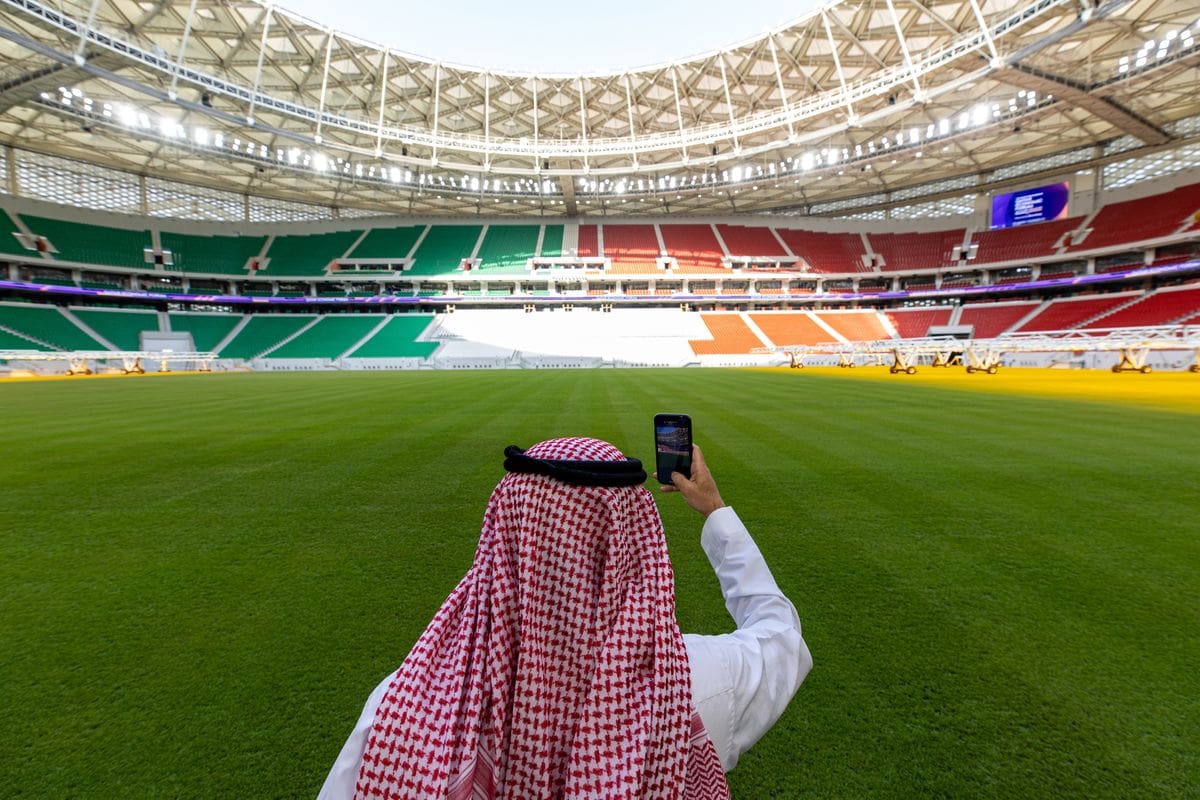

The Clash of Civilisations in Qatar
As the football reached its epic climax in the Qatar desert last week, the increasingly unhinged FIFA president, Gianni Infantino, declared the 2022 World Cup “the greatest ever”. It was certainly melodramatic. In a curious way the month-long event in the uber wealthy Gulf Sheikhdom reflected and magnified the state of the post-Western world disorder and what the late Samuel Huntington presciently described in 1996 as the inexorable clash of civilisations. Huntington observed that as the West declined economically, demographically, and territorially compared with challenger cultures like China, the Muslim world, Latin America and Eurasia, so too would its soft power.
The official FIFA slogan of the World Cup was “Football unites the world”, which echoes an elite orthodoxy that has been promoted relentlessly by Davos Man and the corporate media ever since Francis Fukuyama announced the dawn of the open, borderless, post-Cold War world after 1990. The problem is that this world isn’t dawning. And football, far from uniting the world, is merely reflecting its mutation into something very different, namely its fracturing into ‘civilisation identities’.
In Samuel Huntingdon’s words, these identities inform an evolving “pattern of cohesion, disintegration and conflict in the post-Cold War world”. Inhabiting “a mirage of immortality” a purblind West failed to see that this brave new world was multi-civilisational. As the challenger cultures acquired Western technologies and secured their manufacturing base, different civilisations came to resent the drive to Westernise (a.k.a. democratise) their societies into accepting a one-size fits all progressive agenda, where supposedly liberal, universal, moral values of human rights and social justice prevail.
This clash between the West and the Rest was immediately apparent in Doha as Western commentators drew attention to Qatar’s appalling human rights record, its brutally cavalier sacrifice of 6,500 migrant slave workers to build its cavernous football temples, while woke football pundits intoned against the Arab kleptocracy’s treatment of women and the LGBTQ+ community.
Burnishing their progressive credentials, the England team and seven other Western nations committed to wearing the ‘one love’ rainbow arm band. The commitment didn’t even survive the first kick. FIFA’s stipulations against the display of political statements ruled that wearing the armband would incur an automatic yellow card. Meanwhile, the England team’s ‘taking the knee’ against racism looked increasingly inane, especially when performed in front of the United States team, which studiously ignored it. Principles were notable only for their flexibility in the post-modern Muslim paradise.
As the BBC commentary team engaged in smug virtue signalling, Infantino righteously denounced the West for “its staggering hypocrisy and racism”. Europeans for their past crimes against humanity, should be “apologising for the next 3,000 years before starting to give lessons to people”. Yet on the eve of the opening ceremony, Infantino, engaged in a further round of bizarrely contradictory pronouncements, declared that he felt Qatari (possibly because he has a large second home there), Arabic, gay, disabled and like a migrant worker because he had been bullied at school for being “a foreigner”. The World Cup was about “pleasure and joy”. Fans wanted to watch “90 minutes without thinking about anything”.
Qatar, of course, maintained it defended human rights “in its own way”. FIFA claimed it went to great lengths to keep political messaging out of its tournament. It even denied Volodymyr Zelensky’s request to share a message of world peace on the eve of the cup final. But in fact, political messaging was subliminally on display everywhere. It took the shape of largely non-Western crowds fanatically disporting their national allegiances. Japanese fans chanted ‘Nippon’ and ‘Banzai’ as their team reached the last 16, South Koreans fanatically declaimed Dae Han Min Guk a homage to the Republic of Korea, while Argentine fans and their football team predictably chanted ‘Muchachos,’ a song denouncing “the fucking English” and the Falklands War they “don’t forget”.
As fancied West European teams fell by the wayside and England predictably choked, the Rest rose in the shape of Argentina, Japan and, of course, plucky little Morocco. Morocco, in fact, served as a proxy for the Arab world in general and Qatar in particular. The North African kingdom and the desert sheikdom share close cultural and business ties. Every Moroccan game was a home tie, with the local fans screaming and whistling incessantly to unsettle their opponents, rather successfully, as their unlikely victory over Portugal demonstrated. Less widely acknowledged was the widespread display of the Palestinian flag at Moroccan games. While the Western media chose to ignore such obvious political messaging, Qatar’s state-owned international broadcaster Al Jazeera regularly hosted broadcasts from the Gaza Strip where Hamas supporters celebrated every Moroccan goal.
As Huntington noted in The Clash of Civilisations, as civilisational affiliations became more pertinent in the borderless post-Cold War world, large migrant communities increasingly identify with different civilisations. In such situations previously coherent nation states become ‘cleft’, as minority populations and their host countries find that “the forces of repul¬sion drive them apart and they gravitate toward civilisational magnets in other societies”. As a result of uncontrolled migration flows these cleavages have become a demographic feature of European and American states.
During the World Cup the ‘cleft’ character of Western Europe became all too apparent. After much fancied Belgium lost to Morocco, Brussels experienced several nights of rioting in the city that hosts a population of 40% Muslim migrants. Riots also broke out in Antwerp and Rotterdam. After France defeated Morocco in the semi-final several days later, rioting again broke out in Brussels, as well as in Paris and Montpellier, where an angry mob assaulted a car disporting a French flag and at least one person died. Yet, somewhat ironically, as the cup final whistle blew, at the end of 120 minutes, the French team consisted of only one native European, the ageing goalkeeper Hugo Lloris. The rest of his teammates on the field hailed from Francophone Africa or were sons of migrant families from the Parisian banlieus.
In these circumstances of civilisational clashes – all too evident in Qatar – Huntington warned states may become ‘torn’. A torn state is one that used to possess a single predominant culture that placed it in one civilisation, but its leaders now want “to shift to another”. In such societies an elite chooses an identity contrary to the inclinations and attachments of the masses. This is evidently not true of the Arab world or of China, but it has become a feature of Western civilisation and was very much in evidence in the Qatar heat where the pundits’ embrace of woke multicultural values clashed with the instincts and beliefs of the masses huddled in their English public houses.
Political elites have at various times attempted to disavow their cultural heritage and shift the identity of their country from one civilisation to another. In no case to date have they succeeded. Instead, they have created schizophrenic, torn countries. In an era of civilisational clashes, woke multiculturalism endeavours to create a country of many civilisations, which is to say a country not belonging to any civilisation and lacking a cultural core.
“Multiculturalism at home threatens the United States and the West,” Huntington observed. At the same time, “universalism abroad threatens the West and the world”. Both deny the uniqueness of Western culture. “The global monoculturalists want to make the world like America,” he wrote. “The domestic multiculturalists want to make America like the world.”
In the deepening clash of civilisations, Europe and America would hang together or hang separately, predicted Huntingdon. England taking the knee but not the United States, the multi-millionaire soccer pundit Garry Neville comparing the treatment of striking nurses, railwaymen and postal workers to migrant workers in Qatar – and the Belgian police’s investigation of progressive European MEPs concealing suitcases stuffed with Euros courtesy of Qatar for supporting its global sporting endeavours – all intimate a West collapsing under the weight of its own hypocrisy and performative contradictions.
Dr. David Martin Jones and Dr. Michael Rainsborough are writers and academics. They hold that football is a window into war, politics and society, and have spent many years intensively researching the subject watching Fulham lose at Craven Cottage.







